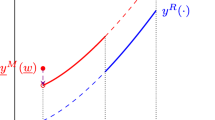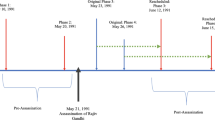Abstract
This paper develops a model of a two-candidate election inwhich the candidates are mainly office-motivated but also tosome (arbitrarily small) extent policy-motivated, and theirchosen platforms are to some (arbitrarily small) extent noisy.The platforms' being noisy means that if a candidate haschosen a particular platform, the voter's perception is thatshe has, with positive probability, actually chosen some otherplatform. It is shown that (i) an equilibrium in which thecandidates play pure exists whether or not there is aCondorcet winner among the policy alternatives, and (ii) inthis equilibrium the candidates choose their own favoriteplatforms, which means that the platforms do not converge.
Similar content being viewed by others
References
Adolph, B. (1996). Commitment, trembling hand imperfection and observability in games. Mimeo, Humboldt University, Berlin.
Alesina, A. (1988). Credibility and policy convergence in a two-party system with rational voters. American Economic Review 78: 796-805.
Austen-Smith, D. and Banks, J.S. (1999). Positive political theory I: Collective preference.Ann Arbor: The University of Michigan Press.
Bagwell, K. (1995). Commitment and observability in games. Games and Economic Behavior 8: 271-280.
Bhaskar, V. and van Damme. E. (2000). Moral hazard and private monitoring. To appear in Journal of Economic Theory.
Calvert, R.L. (1985). Robustness of the multidimensional voting model: Candidate motivations, uncertainty, and convergence. American Journal of Political Science 29: 69-95.
van Damme, E. and Hurkens, S. (1997). Games with imperfectly observable commitment, Games and Economic Behavior 21: 282-308.
Dixit, D., Grossman, G.M. and Gul, F. (2000). The dynamics of political compromise. Journal of Political Economy 108: 531-568.
Downs, A. (1957).An economic theory of democracy. New York: Harper & Row.
Fershtman, C. and Kalai, E. (1997). Unobserved delegation. International Economic Review 38: 763-774.
Grossman, G.M. and Helpman, E. (2001). Special interest politics. Cambridge, MA.: MIT Press.
Güth, W., Kirchsteiger, G. and Ritzberger, K. (1998). Imperfectly observable commitments in n-player games. Games and Economic Behavior 23: 54-74.
Hotelling, H. (1929). Stability in competition. Economic Journal 39: 41-57.
Huck, S. and Müller, W. (2000). Perfect versus imperfect observability - An experimental test of Bagwell's result. Games and Economic Behavior 31: 174-190.
Levine, D.K. and Martinelli, C. (1998). Reputation with noisy precommitment. Journal of Economic Theory 78: 55-75.
Maggi, G. (1999). The value of commitment with imperfect observability and private information. RAND Journal of Economics 30: 555-574.
McKelvey, R. (1979). General conditions for global intransitivities in formal voting models. Econometrica 47: 1086-1112.
Miller, G.J. (1997). The impact of economics on contemporary political science. Journal of Economic Literature 35: 1173-1204.
Oechssler, J. and Schlag, K. (2000). Does noise undermine the first-mover advantage? An evolutionary analysis of Bagwell's example. International Game Theory Review 2: 83-96.
Persson, T. and Tabellini, G. (2000). Political economics: Explaining economic policy. Cambridge, MA.: MIT Press.
Plott, C.R. (1967). A notion of equilibrium and its possibility under majority rule. American Economic Review 57: 787-806.
Roemer, J.E. (1994). A theory of policy differentiation in single issue electoral politics. Social Choice and Welfare 11: 355-380.
Wittman, D. (1983). Candidate motivation: A synthesis of alternative theories. American Political Science Review 77: 142-157.
Author information
Authors and Affiliations
Rights and permissions
About this article
Cite this article
Lagerlöf, J. Policy-Motivated Candidates, Noisy Platforms, and Non-Robustness. Public Choice 114, 319–347 (2003). https://doi.org/10.1023/A:1022637701978
Issue Date:
DOI: https://doi.org/10.1023/A:1022637701978




